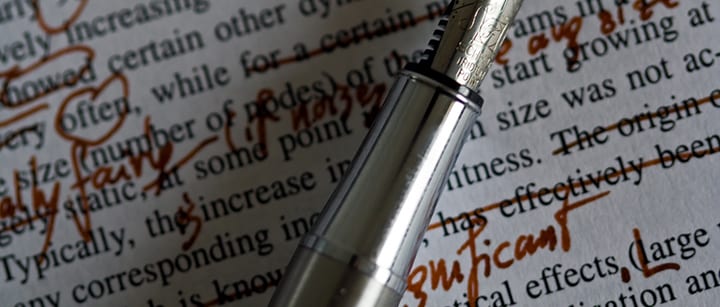Writing a paper for class? Lock down an “A” with these helpful tips from San Diego tutor Natalie S…
Over the course of your academic career, you will be expected to write multiple papers that will span a number of different subjects and purposes. While there are many ways to write a paper, below are a few of the common mistakes to avoid that are true for all types of papers.
1) Create a strong thesis BEFORE you start writing the paper.
Do not begin the writing process without a thesis statement in place. A thesis is the argument in the introductory paragraph that you prove throughout the entire paper. This statement drives your paper and dictates which subjects, examples, quotations, and statistics you include. Creating your thesis statement is the hardest part of writing a paper, but it’s also the most important. It is the single piece that guides you and your readers. You know you have a strong thesis argument if someone can hear it and say, “No, I disagree with that” and if you can respond back, “No, my statement is correct and here are three reasons why I’m correct.” Learn more about writing a thesis statement here.
2) Create an outline BEFORE you start writing the paper.
Once you write your thesis statement, it becomes much easier to organize the rest of the paper. Now, you can create an outline that will help you even further to organize your paper. The goal is to do a lot of legwork in the beginning, so when you are ready to write the paper, all you have to do is thread together all of your notes into a cohesive essay. In your outline, choose three supporting statements and then two to three supporting examples, quotations, and/or facts from the text to back up each of those statements.
3) Don’t make assumptions about the essay prompt.
Here’s a fun fact that teachers generally do not want their students to know: teachers aren’t perfect, and their assignments aren’t always perfect either. Sometimes, teachers write vague or ambivalent essay prompts. For example, in 2006, the College Board wrote an essay question for the AP English Literature exam that asked for students to write about a novel that “establishes a country setting.” Students interpreted country to mean a nation, but the College Board meant a pastoral setting. Thousands of students wrote on the wrong topic because the question was vaguely worded. When in doubt, ask your teacher to clarify his or her intentions, so you can fulfill those expectations when writing your paper.
4) Stay focused. Remember, the thesis is your guiding statement throughout the paper.
You need to write out your thesis statement clearly, and then you need to support that argument with clear examples, quotations, and facts from the book. Follow your outline to stay focused on your main topic, and avoid rambling on about characters, facts, or your own opinions that do not directly relate to the topic at hand.
5) Don’t just summarize the text.
When you are writing a paper, you are supposed to make inferences and draw conclusions to create an argument that you can prove throughout your paper. Your teacher is not asking you to summarize the text or the story. Stay away from repeating the same points, and refer back to your outline to come up with original ideas. Instead of talking in circles, find new arguments to add to your essay that expand your argument, instead of just repeating it.
6) Don’t forget to use citations.
So many students are unduly suspected of plagiarism because they forget to cite their sources when they write a research paper. Just to be clear on whether to cite or not, always consider whether the fact or piece of information is considered basic or common knowledge. If it isn’t, then you need to cite it.
7) Never play with the spacing.
This is more of a formatting flaw than a writing one, but important to note nonetheless. Sometime students alter the margins, font size, and spacing of their essays to make it look like they wrote more than they did. Teachers look at papers all day, and they can see who altered the margins and who wrote the required amount. Keep the margins at one inch, and organize your thesis statement and your outline thoroughly from the beginning, and you’ll have plenty to write about.
8) Don’t forget to proofread!
Remember, even seasoned adults can make typos or grammatical mistakes, so always check over your work before you submit it. If you’re struggling with clarity, ask an adult to read your paper and tell you what they think your thesis is. Proofread for both grammar and spelling before you turn your work in, and if you need additional assistance, you can always ask a tutor!
What is one of your favorite tips or tricks for writing a paper? Leave a comment to share with us!
 Natalie S. tutors English, ESL, History, Phonics, Reading, and test prep in San Diego, as well as through online lessons. She received her BA in English Education at the University of Delaware, and her MA in English Literature at San Diego State University. Learn more about Natalie here!
Natalie S. tutors English, ESL, History, Phonics, Reading, and test prep in San Diego, as well as through online lessons. She received her BA in English Education at the University of Delaware, and her MA in English Literature at San Diego State University. Learn more about Natalie here!
Photo by Unhindered by Talent
Suzy S.


